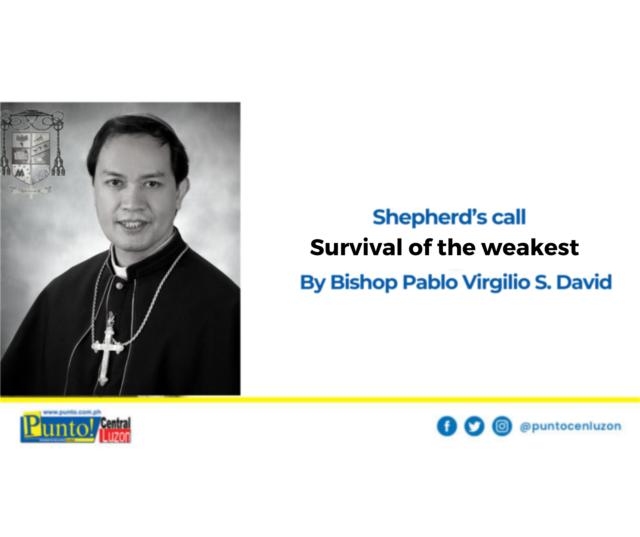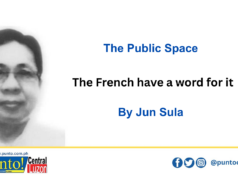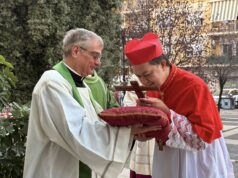I TOOK my inspiration for our reflection today on the Eucharist from the word VIATICUM, which is what the Catholic Church calls Holy Communion when it is given to the sick and the dying. I searched the Latin dictionary and found out that its original meaning was “provision for the journey.” The historical setting was a tradition of the ancient Romans when someone important to them was setting out on a journey: they would prepare for him what they called a VIATICUM. In Tagalog we call it “PABAON sa naglalakbay.“ Literally, VIA-TE-CUM in Latin means, “something you bring with on the way.”
Our first reading today gives us a proper context. It recalls the basic narrative of salvation of Israel, which is built around a story of liberation. They were slaves in a foreign land and they dreamed of freedom. God nurtured that dream in them through Moses. But the great challenge was not just escaping from slavery in Egypt. They had to cross a barrier described in Deuteronomy 8 as “a great and terrible desert full of fiery serpents and scorpions, an arid land where there is no water.”
We often associate the OT Passover with the crossing over the red sea, made possible by the sacrifice of the lamb. But we often forget that that was just the start of it, the beginning of an impossible journey that took them 40 years. There was no short cut between slavery in Egypt and freedom in the Promised Land; they had to endure a long desert journey.
The writer of Deuteronomy tells us about the provision that God gave them on the way, their Viaticum: themanna from heaven. We usually have a romantic picture of MANNA, forgetting that they actually called this food their “bread of affliction.” Meaning, it was not really anything delicious, but it was adequate enough to nourish them for the journey. You see, in times of affliction, you can’t be choosy; you eat what is available. I remember my mother telling me they learned to eat the core of the banana or even rats from the rice fields in order to survive the Japanese occupation.
What enabled them to endure the manna? The writer says, God’s Word. God fed them with the bread of affliction to make it clear to them that the provision that they needed for the journey was not just food for their stomachs but also food for their souls. And so, thewriter says, “He let you be afflicted in the desert and gave you manna, a food unknown to your ancestors in order to make it clear to you that it is not by bread alone that man lives but by every word that comes from the mouth of God.” It was God’s Word that made them endure and survive the desert; it kept them together and strengthened them for the journey—their Holy Communion.
This is the reason why we always celebrate the Mass in Two Parts, two liturgies, two communions: the Word and the Eucharist. Pope Benedict calls the Eucharist the Sacrament of love at which we are fed from two tables: the AMBO from which the Word of God is proclaimed, and the ALTAR from which the Body of Christ is offered.
We express our communion in the Eucharist when the minister lifts the consecrated bread and says, THE BODY OF CHRIST, and we answer, AMEN! We express our communion in the Word of God when the Lector says, THE WORD OF THE LORD, and we say, THANKS BE TO GOD! The Word always leads to the Eucharist, through which we receive Christ as our Bread of Life. It is how he wants us to live: that we imitate him. We receive him so that we can change and grow and be part of him or become like him. That we also learn to offer our lives to the world as PANTAWID, as provision for the journey. Because God is love, only his love will see us through.
In the Eucharist, Christianity has redefined the journey. It is no longer just our historical journey as a people in this world, in the here and now, but a journey to the Great Beyond, the Hereafter. The provision is still God’s Word, but now made flesh in Jesus Christ. He becomes our ultimate Viaticum. Communion for us is no longer just about receiving Christ into our individual selves, but becoming part of Christ’s body, the Church. Receiving him means partaking of his suffering, death and resurrection so that we can take part in his mission. He is, as that famous song of Simon and Garfunkel says, “like the bridge over troubled waters.”
This is how Jesus talks about the Eucharist in our Gospel. He calls himself the living bread, the food for the journey.
There is a popular Filipino song sung by Marco Sison entitled MY LOVE WILL SEE YOU THROUGH, that captures this thought very well:
My love will see you through
When you reach for your star
When you cross the deepest sea
When you climb the highest hill
my love will always be with you
In everything you do
In every step you’ll make
In every road you take
Don’t be afraid to follow your dreams
For my love will see you through”
I think of this as the song of God, the song of Jesus to all of us: I offer you my love as VIATICUM, “pantawid sa inyong paglalakbay,” your provision for the journey.
Dear friends, as we’re journeying through this pandemic crisis, perhaps we must reflect on the dangers along the way. The danger about being on a survival mode is, we can get dehumanized by it. We will often be tempted to switch to the beast mode. We will look at each other, not as fellow travelers or companions in the journey but as competitors in the meager provision—like we do in panic buying.
We will give up the democratic institutions that took more than a century to build. We will tend to make short cuts or get easily seduced by “quick solutions”. In the beastly survival mode, we will find it expedient to eliminate those whom we consider a liability to the journey—the weak, the sick, those who stray. This is the tendency with most populist political options: they obtain power by reinforcing a mass hysteria over societal problems. They maintain that power by keeping the citizens in a state of delusion. They go for solutions that diminish our humanity and bring out the worst in us.
Christianity defies the instinctive survival mode with its option for love and compassion in times of adversity. It is not after the survival of the fittest but the deliberate option of the strong and able for the SURVIVAL OF THE WEAKEST, by being ready for sacrifice and self-offering. Meaning, we refuse to allow the challenges of the journey to turn us into beasts. Rather, we allow ourselves to be purified by them. We allow them to bring out what is most noble in us, what is true, good, and beautiful about us.
Nourished by the self-sacrificing love of Christ, we learn to rise above ourselves. We learn to lay ourselves down, LIKE A BRIDGE OVER TROUBLED WATERS, like a bridge to the great beyond.
(Homily for Corpus Christi Sunday, 14 June 2020, John 6:51-58)





